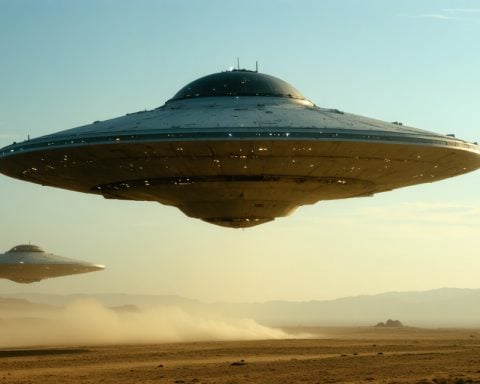- AI technology has enabled a virtual duet between Eddie Vedder and the late Tom Petty, creating a unique musical experience.
- Using machine learning and natural language processing, the AI captures the distinct vocal styles of both artists.
- This innovation represents a new frontier for music interactions, potentially allowing fans to engage with both current and past artists in unprecedented ways.
- The development raises important questions about copyright and the ethical use of AI-generated performances.
- The fusion of music and technology offers exciting possibilities for honoring and perpetuating the legacies of iconic musicians.
The music world is abuzz with excitement thanks to an extraordinary technological innovation: a virtual jam session featuring the indelible voices of Eddie Vedder and the late Tom Petty. Using cutting-edge AI technology, developers have managed to synthesize a duet that never was—transporting fans into a parallel universe where these two rock legends perform a newly imagined collaboration.
This revolutionary AI platform utilizes machine learning algorithms and natural language processing to analyze decades of their vocal recordings. By capturing the essence of Vedder’s deep, soulful tones and Petty’s unmistakable drawl, the AI creates a harmonious blend that resonates with the authenticity and brilliance of live performances.
This technological feat not only celebrates the legacy of these iconic artists but also opens up new avenues for the music industry. Developers are envisioning a future where fans could experience unprecedented interactions with their favorite artists, both living and departed. Imagine attending a concert where AI resurrects definitive voices, offering renditions of songs that never existed.
This innovation raises questions about copyright and the implications of using AI-derived performances without the artist’s direct consent. However, as technology advances, it offers endless possibilities for honoring musical legacies and exploring uncharted creative territories.
As the world tunes into this unique virtual jam, it is clear that the intersection of music and technology is reshaping the landscape, allowing fans a glimpse into what might have been had these two legends shared the stage.
Virtual Jam Sessions: Is AI Resurrecting Music Legends for a New Era?
How is AI Technology Redefining Music with Virtual Jam Sessions?
The fusion of AI technology and music has opened groundbreaking possibilities, allowing fans to experience unique virtual collaborations like never before. By employing _machine learning_ algorithms and _natural language processing_, developers create synthesized duets of rock legends such as Eddie Vedder and Tom Petty. This technology captures the intricate details of each artist’s vocal nuances, producing a performance that feels strikingly authentic.
1. Market Potential and Future Trends: As AI technology matures, the potential for virtual concerts and AI-driven music experiences is colossal. This innovation is pacing towards a future where AI could routinely pair artists across genres and eras, creating entirely new market opportunities for music consumption and artist engagement.
2. Implications for Intellectual Property: The use of AI to synthesize artist performances inevitably raises complex copyright issues. Legal frameworks are still evolving to address questions around consent and the rightful ownership of AI-generated music. Artists and industry stakeholders need guidelines to ensure that creators’ rights are protected while embracing technological advancements.
3. Innovations and Market Forecast: Developers are exploring AI applications beyond virtual jams, with potential uses in developing personalized music experiences and interactive fan engagements. Trends suggest a shift toward _AI-assisted_ music production could redefine how new music is created, with a projected market growth driven by this innovative fusion of art and technology.
What Are the Pros and Cons of AI-Synthesized Music?
Pros:
– Nostalgic Appeal: Enables fans to hear “new” performances from beloved artists, providing a sense of connection to musical legends.
– Creative Opportunities: Opens up innovative possibilities for creating music that transcends time and genre limitations.
– Increased Access: Offers potential for immersive concert experiences where fans can interact with AI-generated music in unprecedented ways.
Cons:
– Ethical Concerns: Raises questions about the ethics of recreating artists’ voices without explicit consent, especially posthumously.
– Quality and Authenticity: While AI can reproduce vocal tones, there may still be debates about whether these performances capture the true spirit and intent of the original artists.
– Legal Challenges: As AI technology advances, the need for clear legal structures becomes pressing to address ownership and rights.
How Might AI Reshape the Future of Live Music Experiences?
AI’s intersection with music could revolutionize live performances, offering fans high-tech concert experiences where they can engage with AI-generated renditions of their favorite songs. These enhanced live events could include tailored setlists, holographic displays, and interactive elements that allow fans to influence the show in real-time. This transformation heralds a new era of music consumption, blending reality with digital finesse.
For further insights into the world of AI in music, check out Roland Corporation to explore how technology continues to enhance the musical landscape.




















